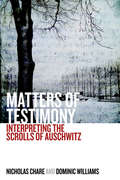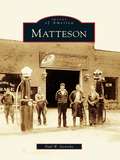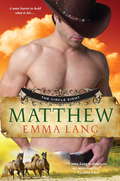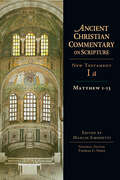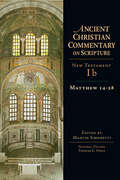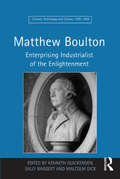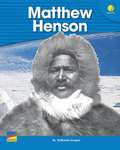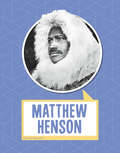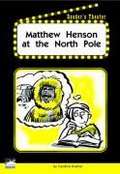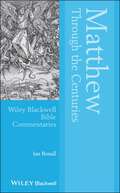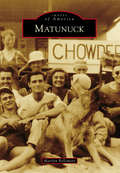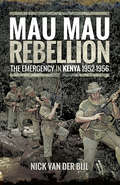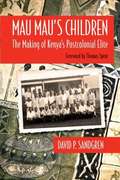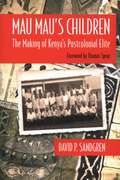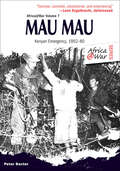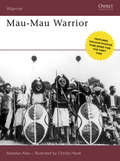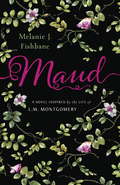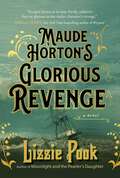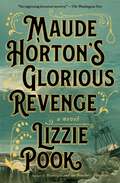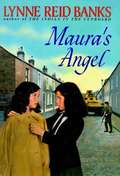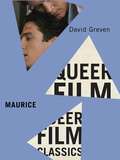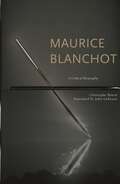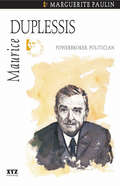- Table View
- List View
Matters of Testimony: Interpreting the Scrolls of Auschwitz
by Nicholas Chare Dominic WilliamsIn 1944, members of the Sonderkommando-the "special squads," composed almost exclusively of Jewish prisoners, who ensured the smooth operation of the gas chambers and had firsthand knowledge of the extermination process-buried on the grounds of Auschwitz-Birkenau a series of remarkable eyewitness accounts of Nazi genocide. This careful and penetrating study examines anew these "Scrolls of Auschwitz," which were gradually recovered, in damaged and fragmentary form, in the years following the camp's liberation. It painstakingly reconstructs their historical context and textual content, revealing complex literary works that resist narrow moral judgment and engage difficult questions about the limits of testimony.
Matteson (Images of America)
by Paul W. JaenickeThe village of Matteson was founded in 1855 and named after the 10th governor of Illinois, Joel Matteson. German immigrants were the area's first settlers, seeking agriculture and business opportunities. The Illinois Central and Michigan Central Railroads provided the stimulus for the growth of one of the first communities to the south of Chicago. The area became popular in the 1890s, when Chicago residents rode special trains to visit the amusement park run by Moses and Freeman Elliott. By the mid-20th century, the town had established itself as a growing bedroom community due to the electrification of the Illinois Central suburban service in 1926 and an increase in residential housing designed for American GIs returning home after World War II. Transportation has always played a key role in the development of the village, which sits at the crossroads of America's first land grant railroad, the Illinois Central, and the country's first transcontinental road, the Lincoln Highway. Since the 1970s, Matteson has grown intoa vibrant retail and commercial area for Chicago's south suburbs.
Matthew
by Emma LangEmma Lang is always on my must-read list. --Cynthia EdenIt is a vast spread in the eastern wilds of the newly independent Republic of Texas, the ranch their parents fought for. . .and died for. To the eight Graham siblings, no matter how much hard work or hard love it takes, life is unthinkable without. . .In the wake of his parents' murder, Matthew Graham must take the reins at the Circle Eight. He also needs to find a wife in just thirty days, or risk losing it all. Plain but practical, Hannah Foley seems the perfect bride for him. . .until after the wedding night. Their marriage may make all the sense in the world, but neither one anticipates the jealousies that will result, the treacherous danger they're walking into, or the wildfire of attraction that will sweep over them, changing their lives forever. . .Praise for Emma Lang and her novels:"A sweet and sensual Western in which the heroine discovers her inner strength with the help of a delightfully sexy hero." --Angela Knight, New York Times bestselling author"With a fresh voice and engaging characters, Emma Lang's Restless Heart kept me reading late into the night." --Tina Leonard, bestselling author
Matthew 1-13 (Ancient Christian Commentary on Scripture #Nt Volume 1a)
by Thomas C. OdenOpus imperfectum in Matthaeum.catena
Matthew 14-28 (Ancient Christian Commentary on Scripture #Nt Volume 1b)
by Thomas C. OdenThe Gospel of Matthew stands out as a favorite biblical text among patristic commentators. The patristic commentary tradition on Matthew begins with Origen's pioneering twenty-five-volume commentary on the First Gospel in the mid-third century. In the Latin-speaking West, where commentaries did not appear until about a century later, the first commentary on Matthew was written by Hilary of Poitiers in the mid-fourth century. From that point the First Gospel became one of the texts most frequently commented on in patristic exegesis. Outstanding examples are Jerome's four-volume commentary and the valuable but anonymous and incomplete Opus imperfectum in Matthaeum. Then there are the Greek catena fragments derived from commentaries by Theodore of Heraclea, Apollinaris of Laodicea, Theodore of Mopsuestia and Cyril of Alexandria. The ancient homilies also provide ample comment, including John Chrysostom's ninety homilies and Chromatius of Aquileia's fifty-nine homilies on the Gospel of Matthew. In addition, there are various Sunday and feast-day homilies from towering figures such as Augustine and Gregory the Great, as well as other fathers. This rich abundance of patristic comment, much of it presented here in English translation for the first time by editor Manlio Simonetti, provides a bountiful and varied feast of ancient interpretation of the First Gospel.
Matthew Boulton: Enterprising Industrialist of the Enlightenment (Science, Technology And Culture, 1700-1945 Ser.)
by Sally BaggottMatthew Boulton was a leading industrialist, entrepreneur and Enlightenment figure. Often overshadowed through his association with James Watt, his Soho manufactories put Birmingham at the centre of what has recently been termed 'The Industrial Enlightenment'. Exploring his many activities and manufactures-and the regional, national and international context in which he operated-this publication provides a valuable index to the current state of Boulton studies. Combining original contributions from social, economic, and cultural historians, with those of historians of science, technology and art, archaeologists and heritage professionals, the book sheds new light on the general culture of the eighteenth century, including patterns of work, production and consumption of the products of art and industry. The book also extends and enhances knowledge of the Enlightenment, industrialization and the processes of globalization in the eighteenth century.
Matthew Henson
by Maryann N. WeidtMathew Henson survived poverty and racism as an African American, and he survived the dangers and challenges of the Arctic one of the first people to reach the North Pole. This book tells the story of a man who risked his life to achieve his dreams.
Matthew Henson (Biographies)
by A.M. ReynoldsHow much do you know about Matthew Henson? Find out the facts you need to know about this explorer of the Arctic. You'll learn about the early life, challenges, and major accomplishments of this important American.
Matthew Henson at the North Pole
by Candice Kramer Pam Hirschfeld Karen LeonPerform this script about Robert Peary's discovery of the North Pole and how his assistant, Matthew Henson, played a major role in the expedition.
Matthew Through the Centuries (Wiley Blackwell Bible Commentaries)
by Ian BoxallThe reception of the Gospel of Matthew over two millennia: commentary and interpretation Matthew Through the Centuries offers an overview of the reception history of one of the most prominent gospels in Christian worship. Examining the reception of Matthew from the perspectives of a wide range of interpreters—from Origen and Hilary of Poitiers to Mary Cornwallis and Bob Marley—this insightful commentary explains the major trends in the reception of Matthew in various ecclesial, historical, and cultural contexts. Focusing on characteristically Matthean features, detailed chapter-by-chapter commentary highlights diverse receptions and interpretations of the gospel. Broad exploration of areas such as liturgy, literature, drama, film, hymnody, political discourse, and visual art illustrates the enormous impact Matthew continues to have on Judeo-Christian civilization. Known as ‘the Church’s Gospel,’ Matthew’s text has been the subject of apologetic and theological controversy for hundreds of years. It has been seen as justification for political and ecclesial status quo and as a path to radical discipleship. Matthew has influenced divergent political, spiritual, and cultural figures such as Francis of Assisi, John Ruskin, Leo Tolstoy, Dietrich Bonhoeffer, and Mahatma Gandhi. Matthew’s interest in ecclesiology provides early structures of ecclesial life, such as resolution of community disputes, communal prayer, and liturgical prescriptions for the Eucharist and baptism. A significant addition to the acclaimed Blackwell Bible Commentaries series, Matthew Through the Centuries is an indispensable resource for both students and experts in areas including religious and biblical studies, literature, history, politics, and those interested in the influence of the Bible on Western culture.
Matthew, The Printer's Apprentice (Fountas & Pinnell Classroom, Guided Reading)
by Chris Coady Casie HermanssonNIMAC-sourced textbook. Clumsy Fool. Matthew hates it when his master calls him "clumsy fool." Why should he stay and work when he's treated so badly?
Matunuck
by Marilyn BellemoreThe village of Matunuck lies on the south coast of Rhode Island in the town of South Kingstown. It was first inhabited by Native Americans, followed by the early Pettaquamscutt settlers, but it was not until after the end of the Civil War that it became a destination for leisure and fun. This took the form of tent colonies on the beach and local farmers that rented out rooms and cottages to summer guests. Today, surfing, fishing, and sunbathing are popular activities at the beloved beaches, yet there is more that draws the thousands of tourists who visit each year. Theatre By The Sea has hosted world-renowned actors like Marlon Brando and Mae West, and beachfront establishments have long attracted a variety of musical acts. The village is also home to a national wildlife refuge, Trustom Pond, that is a safe haven to an array of species and is still preserved today.
Mau Mau Rebellion: The Emergency in Kenya, 1952–1956
by Nicholas van der BijlIn The Mau Mau Rebellion, the author describes the background to and the course of a short but brutal late colonial campaign in Kenya. The Mau Mau, a violent and secretive Kikuyu society, aimed to restore the proud tribes pre-colonial superiority and rule. The 1940s saw initial targeting of Africans working for the colonial government and by 1952 the situation had deteriorated so badly that a State of Emergency was declared. The plan for mass arrests leaked and many leaders and supporters escaped to the bush where the gangs formed a military structure. Brutal attacks on both whites and loyal natives caused morale problems and local police and military were overwhelmed. Reinforcements were called in, and harsh measures including mass deportation, protected camps, fines, confiscation of property and extreme intelligence gathering employed were employed. War crimes were committed by both sides.As this well researched book demonstrates the campaign was ultimately successful militarily, politically the dye was cast and paradoxically colonial rule gave way to independence in 1956.
Mau Mau's Children
by David P. SandgrenIn 1963 David P. Sandgren went to Kenya to teach in a small, rural school for boys, where he remained for the next four years. These were heady times for Kenyans, as the nation gained its independence, approved a new constitution, and held its first elections. In the school where Sandgren taught, the sons of Gikuyu farmers rose to the challenges of this post colonial era and, in time, entered Kenyan society as adults, joining Kenya’s first generation of post colonial elites. InMau Mau’s Children, Sandgren has reconnects with these former students. Drawing on more than one hundred interviews, he provides readers with a collective biography of the lives of Kenya’s first postcolonial elite, stretching from their 1940s childhood to the peak of their careers in the 1990s. Through these interviews,Mau Mau’s Childrenshows the trauma of growing up during the Mau Mau Rebellion, the nature of nationalism in Kenya, the new generational conflicts arising, and the significance of education and Gikuyu ethnicity on his students' path to success.
Mau Mau's Children: The Making of Kenyas Postcolonial Elite (Africa and the Diaspora: History, Politics, Culture Series)
by David SandgrenThrough these interviews, Mau Mau's Children shows the trauma of growing up during the Mau Mau Rebellion, the nature of nationalism in Kenya, the new generational conflicts arising, and the significance of education and Gikuyu ethnicity on his students' path to success.
Mau Mau: The Kenyan Emergency 1952–60 (Africa at War #7)
by Peter BaxterThe Second World War forever altered the complexion of the British Empire. From Cyprus to Malaya, from Borneo to Suez, the dominoes began to fall within a decade of peace in Europe. Africa in the late 1940s and 1950s was energized by the grant of independence to India, and the emergence of a credible indigenous intellectual and political caste that was poised to inherit control from the waning European imperial powers. The British on the whole managed to disengage from Africa with a minimum of ill feeling and violence, conceding power in the Gold Coast, Nigeria and Sierra Leone under an orderly constitutional process, and engaging only in the suppression of civil disturbances in Nyasaland and Northern Rhodesia as the practicalities of a political hand over were negotiated. In Kenya, however, matters were different. A vociferous local settler lobby had accrued significant economic and political authority under a local legislature, coupled with the fact that much familial pressure could be brought to bear in Whitehall by British settlers of wealth and influence, most of whom were utterly irreconciled to the notion of any kind of political hand over. Mau Mau was less than a liberation movement, but much more than a mere civil disturbance. Its historic importance is based primarily on the fact that the Mau Mau campaign was one of the first violent confrontations in sub-Saharan Africa to take place over the question of the self-determination of the masses. It also epitomized the quandary suffered by the white settler communities of Africa who had been promised utopia in an earlier century, only to be confronted in a postwar world by the completely unexpected reality of black political aspiration. This book journeys through the birth of British East Africa as a settled territory of the Empire, and the inevitable politics of confrontation that emerged from the unequal distribution of resources and power. It covers the emergence and growth of Mau Mau, and the strategies applied by the British to confront and nullify what was in reality a tactically inexpert, but nonetheless powerfully symbolic black expression of political violence. That Mau Mau set the tone for Kenyan independence somewhat blurred the clean line of victory and defeat. The revolt was suppressed and peace restored, but events in the colony were nevertheless swept along by the greater movement of Africa toward independences, resulting in the eventual establishment of majority rule in Kenya in 1964. Peter Baxter is an author, amateur historian and African field, mountain and heritage travel guide. Born in Kenya and educated in Zimbabwe, he has lived and travelled over much of southern and central Africa. He has guided in all the major mountain ranges south of the equator, helping develop the concept of sustainable travel, and the touring of battlefield and heritage sites in East Africa. Peter lives in Oregon, USA, working on the marketing of African heritage travel as well as a variety of book projects. His interests include British Imperial history in Africa and the East Africa campaign of the First World War in particular. His first book was Rhodesia: Last Outpost of the British Empire; he has written several books in the Africa@War series, including France in Centrafrique, Selous Scouts, Mau Mau and SAAF's Border War.
Mau-Mau Warrior
by Christa Hook Abiodun AlaoThe Mau-Mau uprising (1952-60) remains a controversial conflict, waged by warriors about whom many myths have been formed, but little truth has been written. Condemned by history as a brutal rag-tag force engaged in oath-taking, cannibalism and witchcraft, the military activities of the Mau-Mau have long been overlooked. Although their skill, organization and unique motivation forced the British government to undertake the longest airlift in military history, and to deploy extensive force at a cost of almost £60 million, before it could claim victory. This book reveals the real men and women behind the Mau-Mau; the truth behind the oaths that bound them together; and how they became a powerful force, paving the way for Kenya's independence.
Maud: A Novel Inspired by the Life of L.M. Montgomery
by Melanie FishbaneFor the first time ever, a young novel about the teen years of L.M. Montgomery, the author who brought us ANNE OF GREEN GABLES. Fourteen-year-old Lucy Maud Montgomery -- Maud to her friends -- has a dream: to go to college and become a writer, just like her idol, Louisa May Alcott. But living with her grandparents on Prince Edward Island, she worries that this dream will never come true. Her grandfather has strong opinions about a woman's place in the world, and they do not include spending good money on college. Luckily, she has a teacher to believe in her, and good friends to support her, including Nate, the Baptist minister's stepson and the smartest boy in the class. If only he weren't a Baptist; her Presbyterian grandparents would never approve. Then again, Maud isn't sure she wants to settle down with a boy -- her dreams of being a writer are much more important. But life changes for Maud when she goes out West to live with her father and his new wife and daughter. Her new home offers her another chance at love, as well as attending school, but tensions increase as Maud discovers her stepmother's plans for her, which threaten Maud's future -- and her happiness forever.
Maude Horton's Glorious Revenge: A Novel
by Lizzie PookFor readers of Sarah Penner and Stuart Turton comes a historical mystery about a young woman in Victorian London who will stop at nothing to avenge her sister after her suspicious death aboard an Arctic exploration ship.An Arctic expedition. A mysterious death. And the lengths to which one woman will go to avenge her sister. When Maude Horton receives a letter from the British Admiralty informing her of her younger sister&’s death, her world is shattered. Bold and daring, Constance had run away from her life in Victorian London two years prior, disguising herself as a boy to board the Makepeace, an expedition vessel bound for the Arctic&’s unexplored Northwest Passage. The admiralty claims Constance&’s death was a tragic accident, but Maude knows when she is being deceived. Armed with Constance&’s diary from her time at sea and a fiery desire for justice, Maude sets her sights on the Makepeace&’s former scientist, Edison Stowe, a greedy and manipulative man who she suspects had a hand in her sister&’s death. When she learns he has a new venture, a travel company that escorts spectators across the country to witness popular public hangings, Maude decides to join the latest tour, determined to extract the truth from Stowe and avenge her sister—no matter the risk to herself. From the stark beauty of the Arctic to the teeming streets of Victorian London, Maude Horton&’s Glorious Revenge is a mysterious, transporting tale about the unbreakable bond of sisterhood and the things we are driven to do by both love and greed.
Maude Horton's Glorious Revenge: A Novel
by Lizzie PookA young woman searches for the truth about her sister, who boarded a ship headed to the frozen Arctic and never returned in this &“engrossing historical mystery&” (The Washington Post).Twenty-year-old Constance Horton has run away from her life in Victorian London, disguising herself as a boy to board the Makepeace, an expedition vessel bound for the icy and unexplored Northwest Passage of the Arctic. She struggles to keep her real identity a secret on the ship, a feat that only grows more difficult when facing the constant dangers of the icy North. Even more dangerous than the cold, the storms, and the hunger, are some of the men aboard—including the ship&’s scientist Edison Stowe. He&’s watching Constance, and she knows that his attention could be fatal. In London two years later: Maude Horton is searching for the truth. After being told by the British Admiralty that her sister&’s death onboard the Makepeace was nothing more than a tragic accident, she receives a diary revealing that Edison Stowe had more of a hand in Constance&’s death than the returning crew acknowledged. In order to get the answers she needs, Maude shadows Edison. She joins him on a new venture he&’s started to capitalize on the murder mania that has all of London in a frenzy—a travel company that takes guests around the country via train to witness public hangings—to extract the truth from him in any way possible. Maude Horton&’s Glorious Revenge is a &“brilliant&” (Publishers Weekly), &“addictive&” (Emilia Hart, New York Times bestselling author of Weyword), &“utterly compulsive&” (Emma Stonex, author of The Lamplighters) novel about the lengths we will go to for justice—and for love.
Maura's Angel
by Lynne Reid BanksIt all started with a shattering bang. Maura found herself flat on her face on the pavement. For moments there was nothing, just blackness and silence. But she knew. Once again, a bomb had exploded in the streets of Belfast. Maura lives in Belfast, Northern Ireland. Her life is hard. Her poor mother, thin and tired, depends on her to care for the baby, get her six-year-old brother off to school, and dress and feed her big sister Colleen, who is as helpless as an infant. Maura's big brother Kieran is in prison for sabotage against the Brits; her father is risking the same, or worse, as a member of the Irish Republican Army. And the war goes on and on. It seems so hopeless. Then, in the wake of the bomb blast, an amazing thing happens. Maura looks up from the pavement and sees a girl lying next to her who looks just like her--except that she's perfect...Also, she's naked! Maura quickly wraps the girl in her own coat and takes her home. Who is this strange creature? Where has she come from? She seems to know nothing of the world--not even simple things like how to eat or fall asleep or talk. She doesn't understand pain. Yet she has a magical way with people. The baby stops crying; quarrels dissolve. Even poor, simple minded Colleen responds to her. Maura's mother smiles again, and their home becomes peaceful and full of exciting moments of magic. When Maura discovers Angela's secret, she trusts her for the miracle that could bring her father and brother home. But Angela doesn't understand Maura's world--a world that spoils miracles, making them go tragically wrong.
Maurice (Queer Film Classics #8)
by David GrevenMaurice, James Ivory’s 1987 adaptation of the E.M. Forster novel, follows an Edwardian man’s journey from the awakening of his desire for and love of men to self-acceptance. One of the most politically resistant films of the 1980s, Maurice dared to depict a young man’s coming-out story and a happy ending for its lovers, Maurice and Alec.James Ivory and producer Ismail Merchant, a couple whose cinema is synonymous with period film adaptation, released Maurice during the first AIDS decade, a time of flagrant transatlantic homophobia. Criticism following its release described Ivory as a superficial and staid director, while the film was received as a regression to the uncinematic and overly faithful style that characterized the early adaptations by Merchant Ivory Productions. Offering a close reading of Forster’s novel and an analysis of Ivory’s distinctive visual style, Richard Robbins’s indelible score, and the performances of James Wilby, Hugh Grant, and Rupert Graves, David Greven argues that the film is a model of sympathetic adaptation. This study champions the film as the finest of the Merchant Ivory works, making a case for Ivory’s underappreciated talents as a director of great subtlety and intelligence, and for the film as one worth recuperating from its detractors.Understanding Maurice as a fully realized work of art and adaptation, this volume offers insight into how a stunning novel of gay love became a classic of queer film.
Maurice Blanchot: A Critical Biography
by Christophe BidentMaurice Blanchot (1907–2003) was one of the most important writers of the twentieth century. His novels, shorter narratives, literary criticism, and fragmentary texts exercised enormous influence over several generations of writers, artists, and philosophers. In works such as Thomas the Obscure, The Instant of my Death, The Writing of the Disaster, The Unavowable Community, Blanchot produced some of the most incisive statements of what it meant to experience the traumas and turmoils of the twentieth century.As a journalist and political activist, Blanchot had a public side that coexisted uneasily with an inclination to secrecy, a refusal of interviews and photographs, and a reputation for mysteriousness and seclusion. These public and private Blanchots came together in complicated ways at some of the twentieth century's most momentous occasions. He was among the public intellectuals participating in the May ’68 revolution in Paris and helped organize opposition to the Algerian war. During World War II, he found himself moments away from being executed by the Nazis. More controversially, he had been active in far-right circles in the ’30s.Now translated into English, Christophe Bident’s magisterial, scrupulous, much-praised critical biography provides the first full-length account of Blanchot’s itinerary, drawing on unpublished letters and on interviews with the writer’s close friends. But the book is both a biography and far more. Beyond filling out a life famous for its obscurity, Bident’s book will transform the way readers of Blanchot respond to this major intellectual figure by offering a genealogy of his thought, a distinctive trajectory that is at once imaginative and speculative, at once aligned with literary modernity and a close companion and friend to philosophy.The book is also a historical work, unpacking the ‘transformation of convictions’ of an author who moved from the far-right in the 1930s to the far-left in the 1950s and after. Bident’s extensive archival research explores the complex ways that Blanchot’s work enters into engagement with his contemporaries, making the book also a portrait of the circles in which he moved, which included friends such as Georges Bataille, Marguerite Duras, Emmanuel Levinas, Michel Foucault, and Jacques Derrida.Finally, the book traces the strong links between Blanchot’s life and an oeuvre that nonetheless aspires to anonymity. Ultimately, Bident shows how Blanchot’s life itself becomes an oeuvre—becomes a literature that bears the traces of that life secretly. In its even-handed appraisal, Bident’s sophisticated reading of Blanchot’s life together with his work offers a much-needed corrective to the range of cruder accounts, whether from Blanchot’s detractors or from his champions, of a life too easily sensationalized.This definitive biography of a seminal figure of our time will be essential reading for anyone concerned with twentieth-century literature, thought, culture, and politics.
Maurice Duplessis
by Marguerite Paulin Nora AlleynDuring his 18-year reign as premier of Quebec, Maurice Duplessis dominated the province and shaped it to his image. A brilliant orator and a scathing wit, Duplessis exercised complete control over his caucus and the Cabinet. If he couldnt get a vote, he bought it. Politics was the fuel that drove his life. He died on the job.
